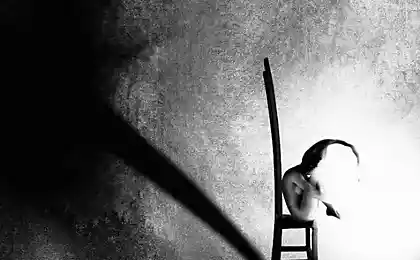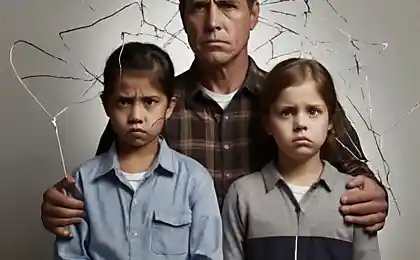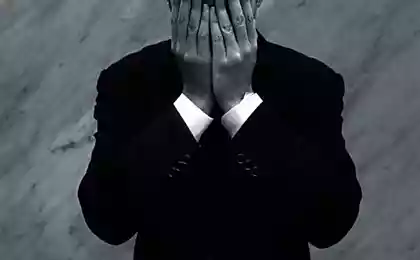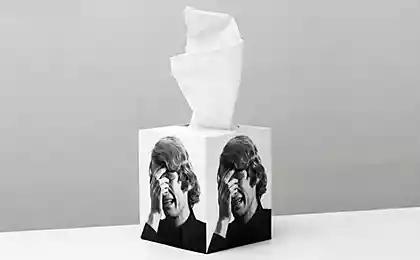731
Guilt - Spirituality or immaturity

Understand that it is - a sense of guilt is not easy. Some consider it socially useful and even necessary to conduct the internal regulator, while others argue that it is a painful complex.
The word wine is often used as a synonym of guilt, while the original meaning of the word is different. "Wines - offense, offense, sin, sin, any unauthorized, reprehensible act." (Dictionary of Russian language "V.Dal). Originally, the word meant the wine itself or the actual damages or compensation for material damage. Guilty - who has violated laws or agreements, and shall indemnify the damage
. There is a big difference between - to be "guilty" and "feel guilty". The man is guilty when he knows in advance that can act or word to hurt or to hurt someone or himself and, nevertheless, it does. The blame is usually recognize for those who caused the damage intentionally or by gross negligence.
There are many people who tend to consider himself guilty, although actually caused deliberate damage was not in reality. They decide what to blame, since listening to the "inner voice" that condemns and accuses them, based on the often false, convictions and beliefs which, as a rule, have been learned as a child.
Guilt - unproductive and even destructive emotional human reaction to self-blame and self-condemnation. Guilt in fact it is aggression directed at themselves - it is self-deprecation, self-flagellation, the desire for self-punishment
. Under the influence of the voice of "internal Prosecutor", which passes sentence "it's all because of you" such people overlook the fact that the intention to cause harm to the fact they were not, and by the way "forget" to find out whether they have been damaged at all. < br> Feeling guilty man feels much more for what did not do or could not change, than something that makes or could change and did not do so. Savings on anything not based the unnecessary and destructive feelings of guilt can and must be avoided. From neurotic guilt is necessary and possible to get rid of.
But even when the offense actually took place, the sense of guilt is destructive.
Meanwhile, as a result of realization of the fact of actual damage caused to the people are able to experience a variety of emotions.
An alternative is to experience guilt of conscience and responsibility. The difference between guilt on the one hand and conscience and the responsibility of the other in our opinion - radically. Although it is fundamentally different things, many people do not see and do not understand the difference between them and often confuse these concepts together.
Conscience - an inner court which is carrying out the moral and self-assessment of their own views, feelings, actions committed by their conformity to its their self-identity, their basic life values and goals
. Conscience appears as internal, often unconscious ban disapproved acts (including internal), as well as a sense of inner pain that signals a man on the inside of a moral protest against court acts contrary to his own deep values and self-identity. Suffering, "pangs" of conscience relates to situations where a person due to some reason has broken its own moral principle and designed to keep him from similar actions in the future.
Conscience is closely linked with a sense of responsibility. Conscience is a powerful inner urge to fulfill ethical standards, including liability rules.
Responsibility - is sincere and voluntary recognition of the need to take care of themselves and others. A sense of responsibility - a commitment to fulfill its obligations and, if they are not met, the willingness to admit error and to compensate the damage, take the actions needed to correct the error. And the responsibility is usually recognized, regardless of intent: Who did - and he responds
. Feeling a sense of guilt, a man says to himself: "I am poor, I deserve punishment, no I'm sorry, I lose heart." Metaphorically, it is described as "heavy load" or "what is eating".
When a person is immersed in his blame, scolding myself for the mistakes it is very difficult - virtually impossible - to analyze their mistakes, thinking how to improve the situation, find the right solution, something really do to remedy the situation
. Strewing ashes on his head ( "If I had not done this, or done this .... Everything would be different"), he looks into the past and get stuck there. While responsibility directs look into the future and encourages progress.
Acceptance of responsibility positions - a necessary prerequisite for the development of personality. The higher the level of human development in the individual, the less his peculiar use such a negative regulator of behavior, as guilt.
Guilt causes profound harm to a person. Feelings of guilt, as opposed to the sense of responsibility, it is unrealistic, vague, blurry. It is cruel and unfair to deprive a person of confidence, reduces self-esteem. It brings a feeling of heaviness and pain causes discomfort, tension, anxiety, confusion disappointment, discouragement, pessimism, melancholy. Wines empties and energy consuming, weakens, decreases the activity of man.
The experience of guilt is accompanied by a painful sense of his own wrong in relation to the other person and the whole of his "badness».
Chronic wine turns into a way of perceiving the world, which is reflected even on a bodily level, literally changing the body, and especially your posture. These people drooping posture, Bent's shoulders, as if they are the usual "load" on its "hump". Diseases of the spine in the seventh cervical vertebra area in many cases (except for obvious injuries) associated with chronic guilt.
Guilt - or spirituality nezrelost- econet.ru
People carrying a child with a chronic guilt as though they would take up less space, they have a special po¬hodka fettered, they never have a wide light step, free gestures, loud voice. They are often difficult to see the man in the eye, they always bow our heads and lowered eyes and on the face - mask
guilt. For mature morally and psychologically healthy individual guilt does not exist. There is only a conscience and sense of responsibility for every step in this world, for the adoption of the Agreement, for the selection and rejection of
selection Negative feelings associated with conscience and responsibility stops with the elimination of their causes. And committing any error does not cause such a person to debilitating internal conflict, it does not feel "bad" - just bug fixes and lives on. And if a particular error can not be corrected, to draw lessons for the future and about her memory helps him not to make such mistakes.
I would like to emphasize that the sense of guilt, which is based on self-punishment and self-deprecation - is directed at himself. Man absorbed by guilt and self-flagellation is not to really feel and other needs.
While the experience caused conscience include regret what he had done to the victim and empathy. They are, in essence, are oriented on the state of the other person - "I hurt him in pain»
. Willingness to recognize its real guilt - one measure of responsibility, but insufficient in itself. Guilt may also (though not always) to encourage its acceptance. However, the finding of his guilt is often presented as a sufficient atonement. Often you can hear the confusion: - "Well, I recognized that blame and apologized - what do you want more from me?". But the victim of this, as a rule, is not enough, and if he does not feel the inner truth and does not need to. He wants to hear about the specific measures to correct mistakes or compensate for the damage. Another increasingly necessary, especially if it is impossible to fix, sincerely express empathy and another its regret, and (if the action was intentional), but also an honest repentance. All this is not only necessary to the victim, but also the one who caused the real damage, brings relief.
Where does our sense of guilt, and why, in spite of the destructiveness it so widespread?
Why do people cling to self-incrimination in situations where they are in no way to blame? The fact that the wine covers helplessness.
Guilt is laid in early childhood under the influence of the features of mental development of the child on the one hand and parental influences on the other.
Age 3-5 years - this is the age when can form a strong feeling of guilt as a negative internal control of behavior, because in this age the child has its own ability to experience that his parents quickly discover and use
. This age period provides for this right soil. "The creative initiative or wine" - the so-called Erik Erikson that period and the corresponding main dilemma of child development
. Guilt arises naturally in a child at this age as a psychological defense against the terrifying feeling of helplessness and shame associated with experiencing them in this period of the collapse of the sense of his omnipotence. The child unconsciously chooses guilt, as the lesser of two evils. As if he had unknowingly told himself, "I already feel that not everyone can, it is intolerable, no, it's just this time did not happen, and in fact I can. I could, but it did. So - I'm guilty. I pomuchayus, and the next time will happen if I will try. »
Under favorable effects of parents the child gradually takes its not omnipotence, overcome guilt and the dilemma is solved in favor of the successful development of creative initiative.
When adverse effects of parents in a child for many years, and sometimes for a lifetime is a tendency to feel a sense of guilt and the restrictions on the manifestation of creativity. "Cargo" of guilt that a person bears a child and as an adult continues to disturb him live and interact with people.
Note that while the origins of chronic guilt lies mainly at the age of 3-5 years, a tendency to feel a sense of guilt as a defense mechanism can be switched on in adulthood, even at relatively favorable childhood. So, guilt is one of the mandatory forms of expression of protest phase in the process of experiencing a significant loss, including serious illness and death of loved ones. Protesting against the enormity of what happened before come to terms with what has happened, accept your helplessness and start grievous mourning, people blamed himself for not having done anything for salvation, despite the fact that it was objectively completely impossible. With favorable childhood is guilt passes soon. In the presence of the children's guilt complex person, a non-existent blame for the loss can remain in the human soul for many years, and the process of experiencing the loss of injury is not completed.
Thus, rather than experiencing the helplessness and shame in situations where we are weak and can not change anything, people "prefer" a sense of guilt, which is illusory hope that can still be corrected.
Those adverse effects of parents who induce and form a constant feeling of guilt, in fact boil down to direct accusations and blame, as well as to recriminations and reproach. This pressure on the guilt - it is one of the main levers that parents use for the formation of his internal behavior of control (which they confused with conscience and responsibility), as well as for the rapid control child in specific situations. Induced wine becomes a kind of whip, spurs to action, which seek to encourage the child's parents, and the whip, substitute education a sense of responsibility. And parents resort to it, as a rule, because they themselves were brought up the same way and still could not get rid of his own eternal guilt.
To blame the child, in fact, wrong. It is, in principle, can not be to blame for what he is accused parents, because he does not bear responsibility for their actions and are not able to bear it. Both adults easily shift its responsibility for the child.
For example: child abuse or blame them for the fact that he broke a crystal vase. However, it is clear that when a small child in the house, parents should remove items of value, it is their responsibility. If anyone is responsible for the broken vase, then the parents, as the child still can not balance their efforts to manage their motor skills, their feelings and motivations and, of course, is not able to track the causal relationships and consequences of their actions. Adults who do not understand the psychological characteristics of the child's ability at first attributed to him, which he does not have, and then blame him for acts committed due to lack as for the alleged intentional. For example: "You do not deliberately go to sleep and not feel sorry for me, give me a break, and I'm so tired," or "Do you really could not play in the street carefully, now I have to wash your jacket, and I'm so tired"
. Worse, often parents and other adults impose unfair child an ultimatum: "If you do not admit your guilt, I will not talk to you." And the child is forced to recognize a non-existent guilt threatened boycott (which is unbearable for the child) or fear of physical punishment.
The pressure on the guilt - it is manipulative influence, which is, of course, destructive to the psyche
. Until then, until the time the child is not able to critically assess what was happening to him, so that all actions of the parents he takes at face value and, instead, to resist the ravages of parental manipulation, obediently submits to them.
As a result of all this, he learns to believe that he is guilty, feel guilty for the sins of the non-existent and, as a consequence, to feel always and all properly.
Such unwarranted usually unconscious and inconsistent pressure of parents and other significant adults in the sense of guilt leads to confusion in the child's head. He no longer understands what is demanded of him - feelings of guilt or error correction. And although the educational plan, it is assumed that by making something bad, the child should experience a sense of guilt, and immediately rush to correct his mistake, the child, on the other hand, he learns that test and demonstrate their guilty - this is a sufficient charge for the perfect offense . And now, instead of correcting mistakes parents receive only look guilty, a plea for forgiveness - "Well, please forgive me, I do so I will not" - and his heavy, painful, self-destructive feelings of his guilt. And a sense of guilt, so substitute responsibility.
To form the conscience and responsibility is much more difficult than guilt and requires situational and strategic efforts.
Reproach and censure - "Are not you ashamed!" "How could you, it is irresponsible!" - Can only cause guilt
. Conscience and responsibility require no censure, and patient and sympathetic explanation of the child inevitable consequences for others and for himself it really wrong actions. Including the one hand about their pain, arousing no guilt, and empathy, and on the other hand, about the inevitable emotional distancing from it to other people, if it will continue to behave this way. And of course there should be an unfair criticism of the child, because he could not control.
Author: Elena Lopuchin
You and the money - "I can not go on, they go through their fingers"
One of the most important laws - the balance between give and take























